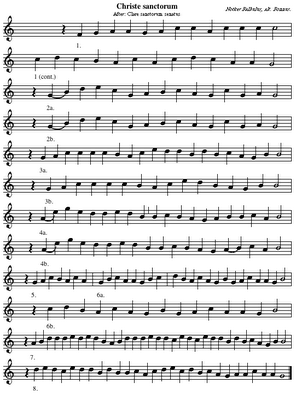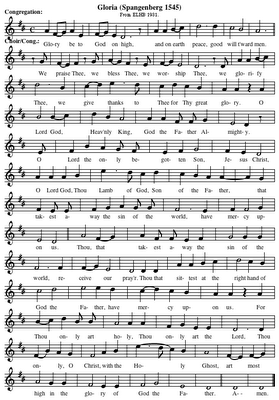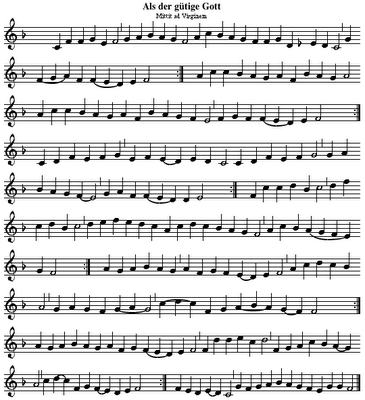The following is translated from Lehre und Wehre, vol. 54, pp. 500–506.
II. Index of Authors
(Conclusion.)
Ludämilie Elisabeth, countess of Schwarzburg-Rudolsadt, born 1640, died 1672 as wife of the count Christian Wilhelm von Schwarzburg-Sondershausen. #253, 372, 394.
Luther, Dr. Martin, founder and master of German hymnody, born in Eisleben, Nov. 10, 1483, died in the same place, Feb. 18, 1546. He formed his hymns partly in a free manner, partly by translation of Latin hymni or integration of old German stanzas or borrowing of biblical excerpts. # 15, 21, 36, 41, 42, 60, 65, 99, 110, 132, 134, 136, 142, 143, 145, 147, 158, 159 (sts. 1–3), 162, 166, 170, 171, 177, 180, 181, 183, 185, 186, 195, 205, 214, 243, 328, 337, 368, 399, 416.
Magdeburg, Johann, born 1525, Gardelegen in the Altmark, evangelical preacher in Esserding, Austria, exiled thence in 1583, pastor in Essen until 1587. #381 (st. 1), the first words of which used to be inscribed on many houses.
Mathesius, Johann, born 1504, Rochlitz, Saxony; a companion at Luther’s home and table while studying in Wittenberg, worked as pastor of the German Lutheran church in Joachimstal, Bohemia, where he died in 1565. His homiletic biography of Luther is among the popular books of our church. #361.
Mentzer, Johann, born 1658, Jahma, Lusatia; died 1734 as pastor in Chemnitz in the same region. His magnificent psalm of jubilation, #349, is a brilliant demonstration of his pious Christian outlook in all his afflictions.
Meyfart, Dr. Johann Matthäus, born 1590, Walwinkel, Gotha; died 1642, as professor of theology and pastor in Erfurt. During the oppression of the Thirty Years’ War he composed his hymn of longing for the heavenly Jerusalem, #443.
Möckel, Johann Friedrich, born 1661, Kulmbach; died 1729, as pastor of Steppbach in Bayreuth. #302.
Molanus, Dr. Gerhard Walther, born 1633 Hameln; died 1722, as abbot of Loccum cloister in Hannover. #203.
Moller, Martin, born 1547 in Kroppstädt by Wittenberg; died 1606 as senior pastor in Görlitz; was a man practiced in suffering, who in the letters of his name M. M. left the constant warning, “Memento mori” (Remember thou shalt die). #225, 258, 342, 352, 362.
Möller, Johann Joachim, born 1660, Sommerfeld; died 1733 as archdeacon in Krossen. #108, 235.
Mühlmann, Dr. Johann, born 1573, Pegau; died 1613 as professor of theology and archdeacon at St. Nikolai, Leipzig; fought the papists and Calvinists with great zeal from both the pulpit and the teacher’s lectern.
Mylius, Johann, from Themar, 1596, in Thuringia. #62.
Nachtenhöfer, Kaspar Friedrich, born 1624, Halle; died 1685 as pastor of Koburg. #27.
Neander, Joachim, the most important poet of the Reformed church in the age of Pietism; born 1650, Bremen; died 1680 as morning preacher at St. Martini, Bremen, wrote the popular, fervent hymn of praise #341.
Neumann, Kaspar, born 1648, Breslau; died 1715 in the same place as pastor of St. Elisabeth, professor, and inspector of the church. Among his 39 hymns, three have become common property of the singing Church: # 109, 268, 316.
Neumark, Georg, born 1612, Langesalza; died 1681 as librarian and archivist in Weimar. His worldly hymns are forgotten, but not his hymn of comfort, # 382, and his responses in hymn #417.
Neumeister, Erdmann, born 1671, Üchteritz by Weißenfels; died 1756 as head pastor at St. Jacobi in Hamburg; was an opponent of Pietism and Unionism. #222, 241.
Nicolai, Dr. Philipp, born 1556 in Mengeringhausen, Waldeck, where he assisted his father in the preaching office; in 1583 became pastor in Hardeck an der Ruhr, and in 1586, of the secret Lutheran congregation in Cologne; 1587 court preacher in Wildungen, and from 1596, in Unna, where, during the time of the plague, he wrote his Joyous Mirror of Eternal Life, as well as both of his famous hymns, #261 and 436; from 1601 head pastor at St. Katharine, Hamburg, where he died in 1608.
Niedlung, Johann, born 1602, Sangerhausen; 1626 was teacher at the college in Altenburg, where he died in 1668 as Scholae senior. #106, 125.
Olearius, Dr. Johann, hymnologist of our church, born in Halle, 1611; general superintendent and senior court preacher of duke August of Saxony in Halle; later in the same position in Weißenfels, where he died in 1684. His hymn #5 serves as a silent prayer upon entering church. #35, 63, 68, 137 (?), 144, 204, 232, 275, 327, 380, 391.
Olearius, Dr. Johann Gottfried, nephew of the preceding, born 1635, Halle, died 1711 as superintendent and consistory advisor in Arnstadt. #26, 151.
Öler, Ludwig, lived around 1530, canon of the St. Thomasstift, Strasbourg. #12.
Opitz, Martin, born 1597, Bunzlau; died 1639, Danzig, as secretary and historian of the King of Poland. It is to his efforts for the German poetic artform that our current hymns owe their greater smoothness. #57.
Pfeffer, Paul, born 1651, Neustadt, Principality of Glogau; died after 1710 as mayor of Budissin (Bautzen). #424 (the responding stanzas).
Pfefferkorn, Georg, born in the village of Iffta outside Eisenach; tutor to the prince at the court of Duke Ernst the Pious; died 1732 as superintendent and consistory assessor of Gräfentonna by Gotha. #285.
Prätorius, Benjamin, born 1636, Obergreislau by Weißenfels; died 1674 as pastor in Großlissa by Delitzsch. #283.
Quirsfeld, Johann, born 1642, Dresden, died 1686 as deacon in Pirna. #422.
Reimann, Georg, born 1570, Leobschütz, Upper Silesia; died 1615 as professor of rhetoric in Königsberg. #114, 155.
Reusner, Adam, (Reißner), born 1496 in Windelsheim, Bavarian Swabia; student of Reuchlin; private secretary of field commander Georg von Frundsberg; follower of Schwenkfeld; died ca. 1575 in the place of his birth.
Rinckart, Martin, born 1586, Eilenburg, Saxony, where he died in 1649; like Herberger and Heermann, he was a faithful leader of his flock during the appalling tribulations visited upon it the Thirty Years’ War. He probably wrote his hymn of thanks, #346, in the year 1630. Hymn #146 can also be trace back to a composition of Rinckart.
Ringwald, Bartholomäus, born 1530, Frankfurt an der Oder; died 1599 as pastor in Langenfeld, Neumark; a zealous defender of Lutheran doctrine and a faithful witness of the truth, who unflinchingly chastised the immorality of his day. #138, 216, 433.
Rist, Johann, writer of many splendid hymns; born 1607, Ottensen by Hamburg; died 1667 as pastor in Wedel, Holstein. Through his hymns he comforted and edified many thousands during the difficult times of the Thirty Years’ War, and continues to do so. # 13, 52, 67, 88, 120, 194, 207, 221, 238, 321, 434.
Rodigast, Samuel, born 1649, Gröben by Jena, died 1708 as headmaster of the Gray Cloister college in Berlin. His only hymn, #376, which however is heard in the whole singing Church, based on Deut. 32:4, was written in 1675 in Jena, for the consolation of an ailing cantor.
Rosenmüller, Johannes, from electoral Saxony, music director in Leipzig and Wolfenbüttel; died 1686. #397 (?).
Rothe, Johann Andreas, born 1688, Lissa by Görlitz; [Count] Zinzendorf’s pastor in Berthelsdorf; died 1758 as Lutheran pastor in Thommendorf in Upper Lusatia; was a powerful preacher of great pastoral faithfulness. He lives on in the Church through his hymn, #240.
Ruopp, Johann Friedrich, a native of Strasbourg; died 1708 as adjunct of the theological faculty in Halle. #266.
Sacer, Dr. jur. Gottfried Wilhelm, born 1635 in Naumburg, Saxony; died 1699 as private attorney in Wolfenbüttel. #14, 82, 121, 131, 425.
Saubert, Dr. Johann, the younger; born 1638 in Nürnberg; died 1688 as professor of theology and superintendent in Altdorf; published the Nürnberg Hymnal, which included his hymn, #393.
Schade, Johann Kaspar, born 1666, Kühndorf by Meiningen, from 1691 deacon at St. Nikolai, Berlin, a fellow minister with Spener; died in that place 1698. #81, 369.
Schalling, Martin, born 1532, Straßburg, died 1608 as pastor in Nürnberg; for his own consolement wrote hymn #271.
Scheffler, Johann, born 1624 in Breslau, from 1649 physician of the Duke of Öls; 1653 deserted to the Roman church under the name Angelus Silesius and became a vehement opponent of the Lutheran church. #72, 250, 280.
Scheidt, Dr. Christian Ludwig, born 1709, Waldenburg by Schwäbisch-Hall; died 1761 as court advisor and librarian in Hannover; was well known for his hymn, #234, which first appeared in 1743.
Schenk, Hartmann, born 1634, Ruhla by Eienach; died 1681 as pastor in Ostheim vor der Rhön. #9.
Schirmer, Michael, born 1606, Leipzig; a friend of Paul Gerhardt; died 1673 as joint headmaster of the Gray Cloister college in Berlin; a hymn-writer much used to bearing his cross, called the “German Job.” #418. Hymn #140 is a reworking of one of his hymns.
Schlicht, Levin Johann, born 1681 in Kalbe in the Altmark; teacher at the paedogogium in Halle; died 1723 as a pastor in Berlin; was able to speak Latin and understand Greek and Hebrew as early as ten years old. #311.
Schmidt, Christian, born 1683, Stolberg in Misnia; died 1754 as pastor at the Bergkirche outside Eilenburg. #332.
Schmolck, Benjamin, born 1672 in Brauchitschdorf by Liegnitz; died 1737 as senior pastor and inspector in Schweidnitz; known as a publisher of devotional literature. Of his 1,200 hymns, our hymnal has #190, 247, 267, 331.
Schneegaß, Cyriakus, born 1546, Busleben by Gotha; died 1597 as pastor in Friedrichroda by the Thuringian Forest; had a thorough knowledge of music; his spouse was a grandniece of Luther’s. #49, 51, 388.
Schröder, Johann Heinrich, born 1667 in Springe by Hannover; died 1699 as pastor in Meseburg by Magdeburg. #249.
Schütz, Johann Jakob, born 1640 in Frankfurt am Main; practiced law; died 1690 in the same place; at the end of his life fell under the influence of the Enthusiasts and renounced the Lutheran church. #350.
Selnecker, Dr. Nikolaus, born 1530 in Hersbruck by Nürnberg; studied under Melanchthon; died 1592 as professor of theology, superintendent, and pastor at St. Thomas in Leipzig; co-author of the Formula of Concord; a much-persecuted, steadfast confessor, whose prayer for constancy, so poignant in its simplicity, was granted by God. #193, 298, 420. Hymn # 165 was partly written by him.
Sonnemann, Ernst, 1608 became joint headmastor of Celle; 1661 pastor in Eimbeck; died there in 1670. #117 (?), reworked after Wegelin.
Spengler, Lazarus, supporter of the Reformation, born 1479, Nürnberg; councilor and jurist in his native city, where he died in 1534. His hymn #236 was once of similar meaning for the Reformation as the hymn of the following author.
Speratus, Dr. Paul, born 1484 in Rötlen, Swabia; was already openly preaching the Gospel from 1519 in Würzburg and Salburg; 1522 in Stephans cathedral in Vienna and in Iglau, for which he was put in prison in Olmütz in 1523, where he wrote his hymn, #237, which he sent to his congregation; the same year came to Wittenberg, at Luther’s recommendation became court preacher of Duke Albert of Prussia; was especially active there in the introduction of the Reformation; died 1551 as Lutheran bishop of Pomesania in Marienwerder.
Stegmann, Dr. Josua, born 1588 in Sulzfeld by Meiningen; died 1632 as professor of theology and superintendent in Rinteln; was force to endure great affliction during the time of the Thirty Years’ War, moving from placed to place as an exile. #2.
Stockmann, Ernst, born 1634 in Lützaen, died 1712 as senior consistory advisor and church advisor in Eisenach. #356.
Thebesius, Adam, born 1596 in Seifersdorf in the principality of Liegnitz; died 1652 as pastor in Liegnitz. #83.
Thilo, Valentin, the Elder, born 1579 in Zinten, East Prussia; died 1620 from the plague as deacon in Königsberg. #33 (sts. 1–3).
Tietze, Christoph (Titius), born 1641 in Wilkau by Breslau; died 1703 as pastor in Hersbruck, Nürnberg. #218, 371, 427.
Walther, Johann, the old Luther-cantor, became court cantor in Torgau around 1520; Luther’s assistant in the institution of the German mann and in the shaping of the evangelical church melodies; died after 1566 as kapellmeister in Dresden. His hymn on eternity, #16, shows that Walther was not only a musician, but also a poet of God’s grace.
Wandersleben, Martin, born 1608 in Wassertalheim, Schwarzburg-Sondershausen; died 1668 as superintendent of Waltershausen in the Gothaischen. #299.
Weidenheim, Johann; the personal details of this man who lived around the turn of the 17th century are unknown. #215.
Weise, Christian, born 1642 in Zittau; from 1676 professor of politics, rhetoric, and poetry in Weißenfels; died 1708 as headmaster of the college in his native city. #231.
Weiße, Michael, born in Neiße, Silesia; 1531 became priest and representative of the German congregation of the Bohemian Brethren in Landeskron, Bohemia; in the same year published the first German hymnal of the Bohemian Brethren; died in that place in 1534, a little over 40 years old. #22, 29, 32, 43, 100, 417, 440.
Weissel, Georg, born 1590 in Domnau, East Prussia; died 1635 as pastor in Königsberg; #31, 58, 148, 245. Hymn #112 is a reworking of one of his hymns.
Werner, Georg, born 1589 in Preußisch-Holland; died 1643 as deacon in Königsberg. #55, 101, 128.
Wiesenmeyer, Burkhard, ca. 1640 teacher at the Gray Cloister college in Berlin; reworker of older hymns; #305.
Zehner, Dr. Samuel, born 1594 in Suhl; died 1635 as superintendent in Schleusingen; wrote hymn #211 in the year 1633 while the Croats were laying siege to the place of his residence.
Zesen, Philipp von, born 1619 in Priorau by Dessau; led the life of a man of letters without a permanent position; died 1689 in Hamburg. #38.
Ziegler, Dr. jur. Kaspar, an authority on law of the first degree, born 1621 in Leipzig; died 1690 in Wittenberg as professor of law. #25.
Zihn, Johann Friedrich, born 1650 in Suhl; died 1719 as archdeacon in his native city. #359.
Zwick, Johannes, born in Constance ca. 1496; died 1542 as an evangelical pastor of his native city in Bischofszell, which he had committed himself to serve for the sake of the local congregation during the time of the plague. #118.
The authors of the following hymns and stanzas are unknown:
Hymns: # 3, 4, 6, 7, 11, 17, 28, 34, 43, 69, 74, 78, 87, 92, 96, 98, 104, 107, 111, 115, 119, 123, 126, 127, 133, 146, 154, 165, 172, 173, 201, 209, 220, 226, 227, 233, 276, 239, 292, 295, 301, 306, 307, 313, 323, 324, 325, 333, 343, 344, 345, 357, 353, 363, 377, 386, 389, 395, 400, 404, 408, 411, 412, 415, 423, 439.
Stanzas: # 8 (st. 4), 10 (st. 7), 21 (st. 1), 33 (st. 4), 50 (st. 7), 35 (st. 7), 83 (st. 1), 136 (st. 1), 174 (sts. 2–3), 177 (st . 2), 195 (st . 1), 213 (st . 4), 320 (st . 10), 348 (st . 5), 381 (st . 2. 3), 417 (st . 8), 423 (st . 5).
The Commission on the Hymnal:
A. Crull.
O. Hattstädt.
J. Schlerf.
Translation © Matthew Carver, 2010.


















